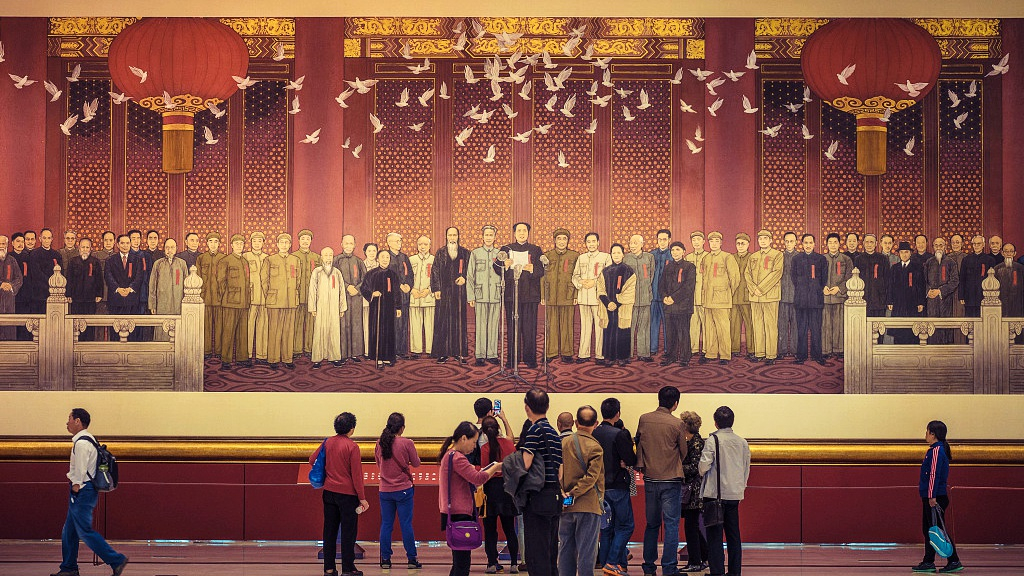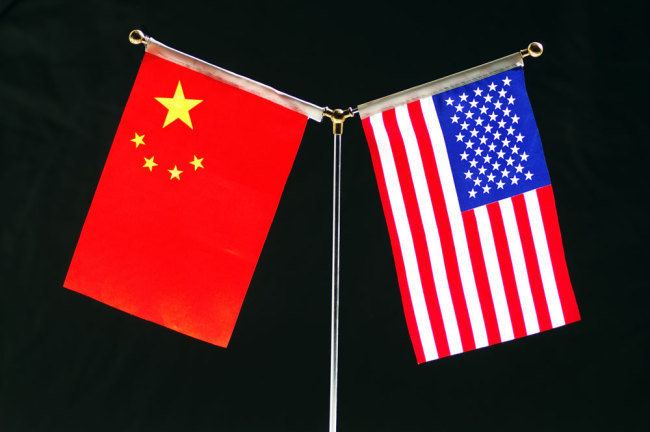
Opinion
10:59, 28-May-2019
Defeat the U.S. containment with the Long March spirit
Updated
16:05, 28-May-2019

Editor's Note: The following is an edited translation of a commentary that was first published on the Chinese-language "Commentaries on International Affairs." The translated version first appeared on China Plus, May 27. The article reflects the author's opinion, and not necessarily the views of CGTN.
The Long March of the Red Army is considered by most observers as one of the most important events of the 20th century, as it ultimately influenced the direction China was going to take in the future. The march through the rugged wilderness by dedicated soldiers is a human epic full of ideals and dedication, written with will and courage. Today, with China being the world's second -largest economy, the effects of a "new Long March" will also be far-reaching as the nation adopts the spirit of the original Long March to achieve national rejuvenation.

National flags of China and the United States. /VCG Photo
National flags of China and the United States. /VCG Photo
The challenges being imposed by the United States on China have entered a new phase. Washington appears relentless in its efforts to cripple China's top tech companies, while at the same time, wooing or coercing its allies to take sides, all in an attempt to deter China's technological development.
U.S. Secretary of State Mike Pompeo has become Washington's point man in the crusade, saying that he's been "explaining the risks" to national security associated with Chinese tech firm Huawei as he travels around the world and meets with various government leaders.
Statistics from China's Research Institute for Machinery Industry show that as of May 17, over 260 Chinese companies have been added to the U.S. Entity List, making up around 22 percent of all foreign firms now under U.S. export controls.
The Trump administration's ultimate goal appears clear. It is continuing to impose extreme pressure on Beijing by cutting supplies to Chinese companies and their affiliated foreign firms as a pressure tactic, as U.S.-China trade negotiations are yet to generate any concrete results.
But in making this move, Washington is grossly underestimating China's innovation capability, as well as the Long March spirit embedded in the Chinese people to motivate themselves. Such spirit is not only epitomized in China's space industry, where rockets are named after the Long March, but also in the will of the Chinese people to unite around a national cause.
Faced with external pressure, the people of China have proven through history that they are willing to place national interests above all else. The people of China will not hesitate to make any sacrifice and overcome any obstacle through strength-of-unity in order to achieve the goals of the country.
China's history has helped shape its future. Nearly 180 years ago, China felt the pain of national humiliation during the First Opium War, through which the people of China drew lessons. The pain of being robbed of national dignity by a foreign power forced the Chinese to look inside themselves to rediscover the pride that comes with the pursuit of national prosperity. Only a few generations after that setback, China re-emerged on the world stage with the development of its first atomic bomb, hydrogen bomb, and artificial satellite. The reform and opening-up drive over the past four decades have provided the tools, and the spirit, that China needed to become the economic power that it is today.
Pursuing scientific and technological progress, and sharing those achievements, is something that all of humanity aspires to. Technology is by no means the exclusive privilege of any one country. Faced with the United States set on creating hegemony over technology, China is once again being called to defend itself, not with guns and bullets, but rather with "zeros and ones." Only by making technological advancements can Chinese companies like Huawei defend their own interests, and the interests of China.
Nearly 180 years ago, British interests attempted to press further into China through the lure of an opium pipe. Today, the United States is using a different opiate. This is the false sense of power and prosperity which nationalism and protectionism claim to provide.
The Chinese people are embarking on a different path the Red Army found itself on more than 80 years ago. The landscape may have changed, but the spirit which drove those Chinese soldiers forward in 1935 can, and will, continue to be found in the Chinese people today.
(If you want to contribute and have specific expertise, please contact us at opinions@cgtn.com.)

SITEMAP
Copyright © 2018 CGTN. Beijing ICP prepared NO.16065310-3
Copyright © 2018 CGTN. Beijing ICP prepared NO.16065310-3